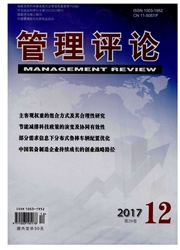

 中文摘要:
中文摘要:
伴随着我国经济的高速发展,人们愈加深刻地体会到工作和家庭领域的角色冲突。为了帮助员工更好的平衡工作与家庭关系,越来越多的组织开始实行家庭友好政策。本研究开创性地从微观的个体层面探讨家庭友好政策作用效果,尝试运用"以人为中心"的实证研究方法,探讨中国员工在边界管理风格方面的个体差异,从而探讨家庭友好政策帮助不同边界管理风格的员工缓解工作-家庭冲突的不同影响方式。研究发现,在中国文化背景下,企业员工的边界管理风格的分布呈现四种类型,同时员工边界管理风格在家庭友好政策和员工工作-家庭冲突之间起到调节作用。企业可以通过制定适宜的家庭友好政策提高员工的幸福感,增加绩效水平。
 英文摘要:
英文摘要:
With the rapid development of economy, people are even more insight into the role conflict between work and family. Family friendly policies are designed by organizations to support employees who are faced with work-family conflict. This study attempts to use a person-centered approach to further explore the individual differences on boundary management style under Chinese culture setting. The results show that in the context of Chinese culture,there are four kinds of boundary management style, and boundary management style moderates the effects of family friendly policies on employees' work-family conflict. Enterprises can improve employees' well-being through the development of appropriate family friendly policies so as to increase the level of performance.
 同期刊论文项目
同期刊论文项目
 同项目期刊论文
同项目期刊论文
 期刊信息
期刊信息
